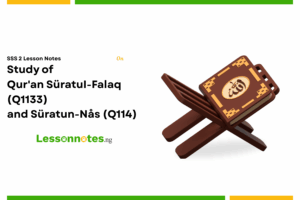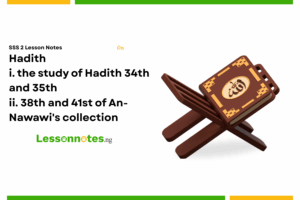Mirath – Inheritance SS2 Islamic Studies Lesson Note
Download Lesson NoteTopic: Mirath – Inheritance
Inheritance (Mirath) refers to the way money and things are shared among family members after someone dies. In Islam, there are clear rules about who gets what after a person passes away. These rules come from the Quran and the teachings of Prophet Muhammad.
Inheritance is very important in Islam. It helps make sure that wealth is shared fairly among family members. It also makes sure that people who need support, like children and wives, are taken care of after someone dies.
Why Inheritance Rules Matter
Before Islam, people often gave all their money and things to their oldest son or strongest family member. Women and young children did not get anything. Islam changed this by making fair rules that give everyone in the family their right share. The Quran says: “Allah commands you concerning your children: the male shall have the equal of the portion of two females.” This shows that Allah wants fairness in how wealth is shared.
Basic Terms in Inheritance
To understand inheritance, we need to know some basic words:
- Mirath: The wealth and things left by someone who has died.
- Warith: A person who gets a share of the inheritance.
- Muwarith: The person who has died and left behind wealth.
- Tarika: All the things, money, and property left by the person who died.
- Wasiyya: A will or special gift that a person asks to be given after they die.
Steps Before Sharing Inheritance
Before the wealth is shared among family members, some important things must be done first:
- Pay for the funeral costs.
- Pay any debts the dead person had.
- Give any gifts that the person asked to be given in their will (wasiyya). This cannot be more than one-third of the total wealth.
- The rest is then shared among the family members according to the rules of inheritance.
Main Heirs and Their Shares
The Quran names specific people who must get shares:
- Husband: Gets 1/2 if his wife dies without children, or 1/4 if she had children.
- Wife: Gets 1/4 if her husband dies without children, or 1/8 if he had children. If there is more than one wife, they share this portion equally.
- Father: Gets 1/6 if the dead person had children, plus any leftover wealth if there are no other male relatives.
- Mother: Gets 1/6 if the dead person had children or siblings, or 1/3 if there are no children or siblings.
- Daughter: Gets 1/2 if she is the only daughter. If there are two or more daughters, they share 2/3 equally.
- Son: Gets twice the share of a daughter. If there is no daughter, sons share all the remaining wealth.
- Full Sister: Gets 1/2 if she is the only sister and there are no children or father. Two or more sisters share 2/3.
- Full Brother: Gets twice the share of a full sister if there are no children or father.
- Grandfather, Grandmother, and other relatives: They get shares based on how closely related they are if the main heirs are not present.
Special Rules to Remember
- A killer cannot inherit from the person they killed.
- People of different religions cannot inherit from each other. For example, a Muslim cannot inherit from a non-Muslim, and a non-Muslim cannot inherit from a Muslim.
- A person can only give up to one-third of their wealth as gifts in their will. The rest must be shared according to the inheritance rules.
- If someone does not have any of the heirs mentioned above, their wealth goes to more distant relatives or to the Islamic state to help poor people.
Example of Inheritance Sharing
Let’s look at a simple example:
Ahmad dies leaving behind:
- His wife (Fatima)
- Two sons (Ali and Hassan)
- One daughter (Aisha)
- His mother (Khadija)
- Total wealth: $12,000
The shares would be given like this:
- First, pay funeral costs, debts, and any gifts from the will.
- From the remaining wealth:
- Wife (Fatima) gets 1/8 = $1,500
- Mother (Khadija) gets 1/6 = $2,000
- The remaining $8,500 is divided among the children, with each son getting twice the share of the daughter:
- Total shares: 2 + 2 + 1 = 5 shares
- Each share = $8,500 ÷ 5 = $1,700
- Ali (son) gets 2 shares = $3,400
- Hassan (son) gets 2 shares = $3,400
- Aisha (daughter) gets 1 share = $1,700
Wisdom Behind Inheritance Rules
Many people wonder why sons get more than daughters in Islamic inheritance. Here are some reasons:
- In Islam, men have more financial duties than women. They must provide for their wives and children, while women can keep their money for themselves.
- Women get inheritance from their fathers, husbands, and sons, while men only inherit from parents and children.
- These rules work together with other Islamic rules about money to create a fair system where everyone’s needs are met.
Conclusion
Inheritance in Islam is a complete system that makes sure wealth is shared fairly. It gives fixed shares to family members based on their needs and duties. By following these rules, we help keep wealth flowing through the family and society in a fair way.
The rules of inheritance are not meant to be changed or ignored. They come directly from Allah and are explained in the Quran. Following these rules is an act of worship and obedience to Allah.
Understanding inheritance helps us prepare for the future and make sure our families are taken care of after we die. It also reminds us that all wealth really belongs to Allah, and we are just taking care of it for a short time while we live.






















